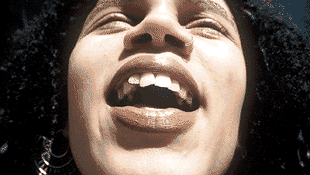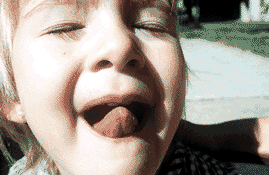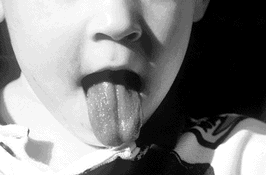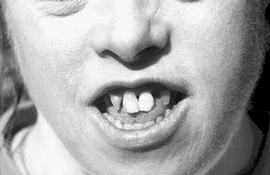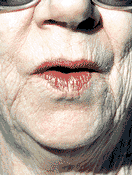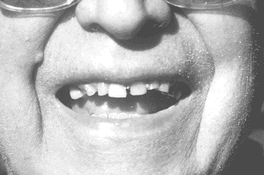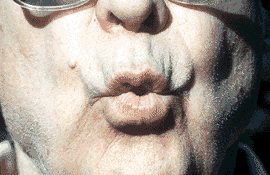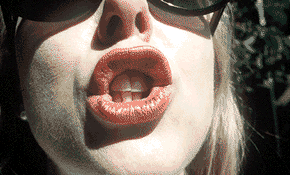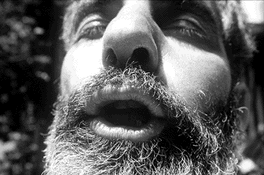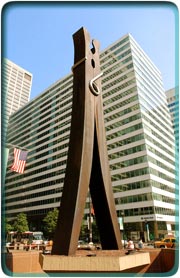For some reason WHYY’s Morning Edition keeps changing the people who read the traffic tie-up reports on Shadow Traffic. And for some reason, none are native Philadelphians anymore. So I have to start my day without the hero who used to warn usabout gaper delays “caused by an overturned tractor trailer on the Wall Women Bridge.”
“Wall Women” — what a superb and bizarre way to pronounce the name of America’s greatest male poet of the 19th century, Walt Whitman! Nobody else says it that way, and no true Philadelphian can say it any other way.
No wonder I love, and proudly speak, Philly’s dialect. Where else can you tell somebody “I hate our winners,” and know they’ll understand you mean, not “I hate the Flyers” (the closest we come to a championship team), but “Ihate the weather in January”? Where else — this is one of my favorites — can a man named Ian and a woman named Ann go through life hearing their names pronounced exactly the same way? Where else can you ask somebody to say a simple sentence,”Little Lulu lives in Little Italy,” and get the glorious gargle of “Gliddle gluglu glives in glillilly”?
Philadelphians talk great. Our dialect is so unique the University of Pennsylvania has had a whole department, led by William Labov, one of America’s most distinguished linguists, studying it for more than 25 years. All language is changing. ButPhiladelphia is changing language more, and changing it faster, than anywhere else in the English-speaking world. Congratulations, fellow phonetic innovators!
But, sadly, articles about our weird and wonderful dialect always stick to old jokes like:
“Jeet yet?”
“No. Jew?”
That’s not Philadelphia dialect. That’s just plain old American Slur Colloquial. Philadelphians talk that way when they’re in a hurry, sure. But so does everybody else in the Northern United States. Concentrating on “Jeet” and”Jew” is like describing the hot dog as Philadelphia food. We do eat hot dogs. But if you want to know Philly, you have to try thatgreat, gooey watch-your-shirt midnight dripper, the cheesesteak.
This article is about cheesesteak Philly speech — the things we do different than anybody else. These are the sounds you can’t help making, and never notice. Because, as linguists say, “Everybody hears their sonic intention.” That’s why TVhasn’t stamped out regional dialects: TV can’t tell you you’re wrong. “Say oil,” says Big Bird, and kids all across the country say “erl,” or “all,” or “oll,” convinced they’ve got it right. Kids learn theirdialect in the schoolyard. Say “oil” in an area where everybody says “erl,” and you get laughed at for talking funny.
Julia Lehman/City Paper
The University of Pennsylvania Research Project on Language Change has been studying Philly dialect by recording our speech on state-of-the-art tape recorders, then feeding it into computers connected to voice spectrographs. A voice spectrographgives a picture, something like an EKG, of human speech. Used to be, linguists had to guess at vowel sounds. Now, they have objective evidence which demonstrates that every time you say a word, you say it slightly different. And also that yourspeech, despite the variants, is as individual as your fingerprints.
What sociolinguists want to know is: Why does language change? Why does it change at different speeds at different times and in different places? After all, chimps and whales and porpoises have been making the same sounds for centuries. Why are humanbeings, who have a much more perfect communication system, constantly messing with it?
Of course, science being what it is, the answer to those questions is more or less, “Who knows?” But Labov does have a theory that might explain some of this. More on the theory later, first the good stuff. Kids, you’ll remember if you everwere one, get a lot of pleasure out of making fun of their friends. Here’s how to make fun of yours.
Julia Lehman/City Paper
But wait, don’t make fun! This is serious science, the work of linguists who do not judge language. To you, a person has “a terrible Philadelphia accent.” To linguists, the person is a fascinating “advanced speaker.” Features ofPhilly dialect like “Iggles” and “graddytude” are usually considered laughable. It’s hard to see why. We don’t think an Irish brogue or Scottish burr is funny. In fact, the same people who think Philly speech is terrible findIrish and Scottish beautiful and poetic. But there’s really no objective beauty or ugliness in sounds. “Bobolink,””smegma,””murmur” and “war” are all just words we use. The English language would be poorerwithout them. Same with dialects. Be nice to your advanced-speaker friends. As you will see, Labov says they usually have a lot more power in the city than you do.
The Philadelphia O
Most Americans say “o” with a round mouth. Philadelphians don’t settle for an easy lip-lazy sound like that. We start with our mouths shaped as if they were going to say “eh?” and end up as if we’re trying to say”oo.”
“Yeowuh Jeowuh, threowuh the ball.”
Want to check your own accent? Say the words in this list: home, roam, chrome, gnome, loam. The last words, which you’re more likely to read than hear, are less likely to have our trademark Philly O. They all sound the same to you? Ask a pal tolisten, you’ll learn different.
The Philadelphia Iggles
Even the boring “Jeet yet” articles know we say “Iggle” for Eagle. Linguists have discovered a Philadelphia Dialect Rule: Shorten both long -e and long -a sounds before -g. Eagle rhymes with Iggle. League rhymes with big. And,though you’ve probably never noticed, in your own speech, vague and plague rhyme with Peg. For some Philadelphians, colleague and fatigue also rhyme with big. But these are words learned later, so many of us use the standard American”coleeg” and “fateeg.”
The Philadelphia Ou
Before -r and -l, “ou” and “ow” both sound like a simple flat “a.””Our” sounds like “are.””Owl” is “Al.””Towel” and “Powel” become “tal” and”pal.” Double sounds get simplified: “mayor” and “prayer” become “mare” and “prare.”
The Philadelphia T
One of the famous features of “Brooklynese” (actually New York City Working Class Dialect) was “bah-ul” for bottle. Linguists call that odd sound a glottal stop. We use the same sound, but only before consonants like -m and -n and-l: Women for Whitman, Dennis for dentist, Clin’in for Clinton, par’ly for partly, foun’in and moun’in and accoun’in’ (for accountant). Local politicians used to say “commi’men'” for commitment, but the word’s gone out of fashion. Maybebecause it reminds them of the end of so many careers: commitment to Allenwood.
The Philadelphia L
The English language has two different pronunciations of -l, but we never notice them because they don’t make any difference in the meaning of words. There’s what’s called The Bright L, very far forward in the mouth; and The Dark L, very far backin the throat. Say the word “feel,” and your tongue ends up pressed against your front teeth. Say “tool,” and your tongue is just touched to your front teeth as an afterthought — many Philadelphians never get their tongues upthere at all. Philadelphians like The Dark L — so dark it’s almost like clearing our throats. Some of us use The Dark L even at the beginning of words — “love,” for example, is said with such a deep gulp that it sounds like”glove.” Want to say that impossible Philly tongue-twister, “Little Lulu lives in Little Italy?” Just practice pressing your tongue against those front teeth. After a while you’ll get the hang of it. Then again, maybe not. ThePhilly tongue is mightier than the will.
I Shore Do
In the cowboy movies I saw as a kid, every real Westerner said “shore” for “sure.” So do Philadelphians. For us, “tour” is “tore,” rather than “tooer.””You’re” and “your” soundexactly like “yore”; “pour” and “poor” the same as “pore.”
Julia Lehman/City Paper
Britishisms, Midwestern English and the Philadelphia A
Standard British Dialect does not pronounce its -r’s. If the Queen of England ever called anybody “fellow worker,” it would come out something like “fellow wuhkah.” Most of the East Coast of the United States still followsBritish practice: “worker” is r-less when said by Ted Kennedy (Boston), William F. Buckley (New York) and Jesse Helms (the South). The Midwest and West, where British influence got lost long ago, pronounces all its -r’s.
Philadelphia has its own Britishisms. We say “pavement” as they do in London, not “sidewalk” as in New York.
Second, alone of major speech groups on the East Coast we pronounce our -r’s. We’re the cutting edge of defiant Americanism in the East. At one time pronouncing -r’s was considered low-class. Henry James, as great a writer as he was an anti-Semitic,anti-immigrant snob (which means very great indeed), gave a speech to Harvard students at the turn of the century in which he said America would never be capable of a real literature until it stopped pronouncing -r’s. To James, -r was “an uglysound… a morose grinding of the back teeth.”
Then in the 1920s, radio networks decided that real culture required pronouncing all the letters in every word. Some announcers, even today, take this so seriously that they pronounce the -t in Christmas, and somehow get their tongues to sound the-th in clothes. A physical impossibility for me. Anyway, -r’s got pronounced by announcers — which of course made them Good English. I’ve had arguments with New Yorkers who insist they pronounce the -r’s in fellow worker, when what they say issomething like “fellow wuhkuhrrrr.” Intervocalic -r, the -r before the consonant, like -k, is very difficult for people who didn’t grow up using it.
The Philadelphia Au
“You’ll never be able to describe this without using the International Phonetic Alphabet,” William Labov says to me. “First of all it’s very difficult to describe sounds made like ‘au,’ in the middle of the mouth. Secondly, this isone of the richest sounds in the Philadelphia repertoire.”
And I can’t describe it. You can hear it everywhere. And you know how to say it: “Come AUWN!” or “Oh no, I cauweaught a cold.” Nowhere is there an “au” to compare with Philly’s. The further west you go, the more thissound gets smoothed out and toned down. By the time it gets to California, people say, “Come ahn,” and “I cot a cold.”
The Philadelphia A
This is the most complicated Philly sound of all. Remember Ian and Ann? Most Philadelphians pronounce both as “Ian,” something like “Ee-yan” squeezed into one syllable. In the Midwest, all -a’s are pronounced like that; it’scalled a tense -a. In Boston, all -a’s have a sound closer to upper-class British: “ah,” or a lax -a. Boston: “I rahn from the bahd mahn holding a fahn, a hahm and a hahmmer.” Midwest (remember that ran here rhymes with Ian):”I ran from a bad man holding a fan, a ham and a hammer.” Philly: “I rahn from a bad man holding a fan, a ham and a hahmmer.”
Great, right? Philadelphia mixes the two -a’s!
Of course there’s a rule for this. Not a rule we have to follow because a grammar book says so. This is a real rule, one that simply describes what we do without thinking.
You use tense -a:
— Before -m and -n: e.g., ham, man, fan, pecan (high-class Philadelphians sometimes say pe-cahn, but of course without changing any of the other words).
— Before -f, -th, -s: laugh, staff, bath, glass.
— In three words ending in -d: mad, bad, glad (but lahd, pahd, brahd, gahd about).
Exceptions:
— -ng gets lax -a: fan is tense, fang is fahng.
— Irregular verbs get lax a: can (a can of peas) is tense; can (I cahn do it) is lax. So are ran, swam, began, am. And the sub-literate dialect word wan, as in “We wahn the war.”
— Exception to the exception: can the verb is lax, can’t is tense.
— The article “an” is lax.
— If a vowel comes after -m or -n in the word, the “a” turns lax: ham is tense, hammer is lax. Fan tense, fanny lax.
It’s probably the complicated Philly A that makes us pronounce radiator to rhyme with gladiator.
Got that? You do. You follow that complex rule every day. But you can confuse your Philly-born pals by getting them to read this list: bat, bad, sat, sad, mat, mad, mash, grad, path, grab, pat, pad, glad, pass, laugh, bath, past, calf, badge, jazz,jam, ham, bag, bang, began, fad, mad, dad. Most kids can do it effortlessly. Most college grads, me included, get hopelessly tangled. Thinking about language, even your own language, isn’t the same as using language.
Julia Lehman/City Paper
Dese Dems and Dose
This is the feature of our dialect that’s most frowned on and denied. It’s a touchstone for recognizing how well you hear your own speech. We all say dese, dem and dose. It’s not the hard -d of movie Brooklynese. It’s a soft, gentle little -dthat makes the sentence go faster: “What’s da trouble?” When you don’t say “da,” and none of us says it all the time, you probably say nothing instead of “th.” It comes out: “What’s a trouble?”
Murray Christmas
But you may refuse to recognize your own speech, and get angry when it’s pointed out to you. Philadelphians make fun of Midwesterners who rhyme Mary, marry and merry. We say all three words differently. But Philadelphians don’t make a distinctionbetween merry and the man’s name Murray — though Philadelphians insist that we do make the distinction, and do hear it when others make it.
Labov’s research team printed a page with a column of merrys and a column of Murrays and gave that to a member of a family. The researchers had another family member sit opposite and read from a random list of merry/Murray. The listener ticked offwhich one was said. Results were always the same: equal to chance, or sometimes less. And — a furious family fight. “What do you mean I said merry? Get the shit out of your ears!””Get the shit out of your mouth, and talk right, you —!” The fights were so bad that the merry/Murray quiz had to be dropped. Try it yourself on friends whose happy marriage you want to test.
Shitty Shtreets
When I first wrote about Philly dialect 25 years ago, this was a new change — or at least one that nobody recognized. Now, if you go to a speech clinic to get rid of your Philadelphia accent (and some misguided self-loathing Philadelphians do),the Philly sh- is one of the first things you’re told to work on.
Other cities say “street,” advanced speakers in Philly tend to say “shtreet.” This is so pronounced that once you start to listen you’ll hear it everywhere. Most Philadelphians, both black and white, have at least a hint of an sh-sound instead of s-, especially before consonants.
But this is Philadelphia, and everybody goes to extremes. Penn’s research project has tapes of Philadelphians, usually women from very refined neighborhoods, saying, “Shitty shtreets are often shtraight.”
Julia Lehman/City Paper
Is There a South Philly Dialect?
Certain areas of every city get the reputation of being the real heart of it. “South Philly Accent” is the name given to lots of speech that you could hear just as easily in Center City or the Far Northeast. But there is adistinguishing feature of some South Philly speech: it’s r-less, like the rest of the East Coast. There used to be a sign in my neighborhood that said, “Frankie is a Bastid.” Good phonetic spelling, but not north of Fitzwater Street. Onetheory about this oddity of South Philly speech is worth mentioning. South Philly was settled by Italian immigrants. Italians pronounce -r’s with an exaggerated trill. Second-generation kids, wanting to avoid their parents’ foreign accent (heavilystigmatized by establishment Philadelphia), solved the problem by leaving -r’s completely out of their speech. If that sounds farfetched, consider this:
Gratitude, What a Beautiful Attitude for a Prostitute to Have!
Philadelphians give those words a good long eeee — “grateeeetude,””prosteeeetute.” Most people who go away to college change their speech, trying (and never succeeding) to disguise their local dialect. This eeee sound was thefirst I got rid of. Like most other language changers, I went too far. And when I came home for vacation nobody could understand me when I talked about “Pennapack Creek.”
Julia Lehman/City Paper
What’s All This Mean? A Plug for Black Vernacular English, and White Vernacular English, Too.
Labov’s conclusion, too complex to do anything more than mention here, is that English is changing along broad lines — a Southern group that includes South Africa, Australia, the American South and California, and a Northern group, whichincludes London and the Northern United States, that’s led by the groundbreaking, not to say jawbreaking, work of us advanced speakers in Philadelphia.
Labov also believes that there’s a use to advanced speaking. Advanced speakers are not the lowest income or education group in a neighborhood. Just the opposite. They’re the kind of person who represents the neighborhood when it wants something.
“College graduates tend to think of political power as a question of how to influence foreign policy,” says Labov. “Neighborhood people think of power as how to get a stop sign, another crossing guard, summer jobs for kids.”
Advanced speech may be the language of negotiation. Just by sounding like somebody with “a strong Philadelphia accent,” you announce your familiarity with local politics. “Tal” and “Come auwn” and “I cahn open a canof peas” are all part of a power dialect.
Of course, this article has been entirely about white speech. There’s a different power dialect for blacks, at least in America, where segregation is still the rule. Readers of the New Yorker will remember Henry Louis Gates, Jr., describinghis first visit to England, when he was not always able to understand Brit English. So he stopped a black street cleaner and asked for directions. And got directions — in the same old unintelligible Brit gabble everybody else spoke. Aside fromJamaicans, blacks in England do not have a separate dialect: the country is — compared to the United States — integrated.
This makes it all the more important for schoolteachers in the United States to know that black dialect is not failed English. We all speak failed English. White teachers don’t notice it when white kids do. But remember, you truly cannot hear thatyou say merry and Murray exactly the same way. Not because you’re stupid, or biologically determined to confuse the words. Once you’re culturally acclimatized to one way of speaking, you have a very hard time hearing your own voice.
Black kids in Philadelphia’s school system were once classed as “Retarded Educable” and put in special classes because they pronounced “pen” like “pin.” This is a feature of black vernacular. The kindly well-intentionedpeople who put these kids in dumbed-down classes thought they were helping. If you can’t distinguish “pin” from “pen,” how will you ever get a good job and make real money?
Well, pronouncing “pen” like “pin” is also a feature of Southern Dialect. Jimmy Carter says “pin” for “pen.” Dan Rather, who grew up in Texas, does the same thing, though (he says) “only when I’mtired.” Californians, part of that great Southern movement of English Language Change, say “pin.” Carter and Rather, and lots of Californians, have been very successful in life.
Julia Lehman/City Paper
Kids, black or white or Asian or Hispanic or whatever, deserve a school system which does not waste time trying to make them talk like teacher. Teacher, after all, might be from the Midwest, and unable to tell Mary from marry. Do we want SouthPhilly, or the Northeast, or our inner city sounding like Ohio?
All of us can make all the sounds in every language. At first. Kids who come to Philadelphia before the age of 12 learn the complicated rule for tense -a/ lax -a. But they learn it on the playground, not at school. And kids who come here after 12never get it straight.
We should let kids talk the way they talk — and concentrate on teaching them to read and write. After all, any speaker of black English, criticized for weird nonstandard constructions, could justly answer, “It could be worse. I could talk likea Philadelphian.”
Julia Lehman/City Paper
